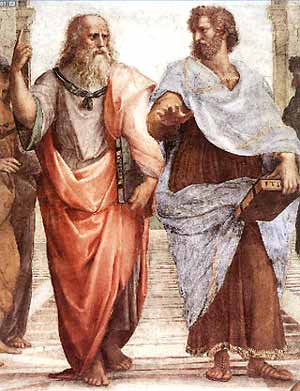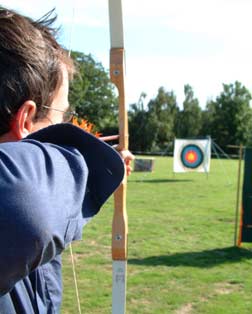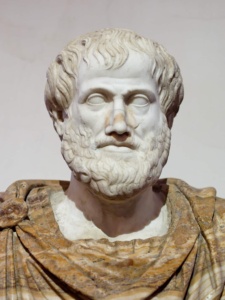Aristotle What Makes Virtue More Exact Than Any Art
Happiness is the significant and purpose of life, the whole aim and end of homo beingness.
Aristotle
Aristotle & Happiness
CONTENTS
- Aristotle's Background
- Happiness every bit Ultimate Purpose
- Aristotle's Hierarchical View of Nature
- Aristotle'southward Definition of Happiness
- Happiness as the Exercise of Virtue
- Aristotle & Friendship
- The Golden Mean
- Bibliography
- Net Resources
"Happiness depends on ourselves." More than everyone else, Aristotle enshrines happiness as a central purpose of human being life and a goal in itself. As a result he devotes more space to the topic of happiness than any thinker prior to the modernistic era.

Living during the same menstruation as Mencius, but on the other side of the world, he draws some similar conclusions. That is, happiness depends on the cultivation of virtue, though his virtues are somewhat more than individualistic than the substantially social virtues of the Confucians.
Even so as we shall see, Aristotle was convinced that a genuinely happy life required the fulfillment of a broad range of conditions, including physical as well as mental well-being. In this way he introduced the idea of a scientific discipline of happiness in the classical sense, in terms of a new field of knowledge.
Essentially, Aristotle argues that virtue is achieved past maintaining the Hateful, which is the residual between two excesses. Aristotle'southward doctrine of the Mean is reminiscent of Buddha's Middle Path, but there are intriguing differences. For Aristotle the mean was a method of achieving virtue, but for Buddha the Heart Path referred to a peaceful way of life which negotiated the extremes of harsh asceticism and sensual pleasance seeking. The Heart Path was a minimal requirement for the meditative life, and non the source of virtue in itself.
Aristotle: A Little Background
Aristotle is 1 of the greatest thinkers in the history of western science and philosophy, making contributions to logic, metaphysics, mathematics, physics, biology, botany, ethics, politics, agriculture, medicine, dance and theatre. He was a educatee of Plato who in plough studied under Socrates. Although nosotros do non actually possess any of Aristotle'due south ain writings intended for publication, we accept volumes of the lecture notes he delivered for his students; through these Aristotle was to exercise his profound influence through the ages. Indeed, the medieval outlook is sometimes considered to be the "Aristotelian worldview" and St. Thomas Aquinas simply refers to Aristotle as "The Philosopher" as though there were no other.
Aristotle was the first to classify areas of human cognition into distinct disciplines such as mathematics, biology, and ideals. Some of these classifications are even so used today, such as the species-genus arrangement taught in biology classes. He was the kickoff to devise a formal system for reasoning, whereby the validity of an argument is adamant by its structure rather than its content. Consider the following syllogism: All men are mortal; Socrates is a man; therefore, Socrates is mortal. Here we can see that every bit long as the premises are true, the decision must also exist true, no thing what we substitute for "men or "is mortal." Aristotle's brand of logic dominated this area of thought until the ascent of modern symbolic logic in the late 19th Century.
Aristotle was the founder of the Lyceum, the first scientific institute, based in Athens, Greece. Along with his instructor Plato, he was 1 of the strongest advocates of a liberal arts didactics, which stresses the instruction of the whole person, including one's moral grapheme, rather than merely learning a ready of skills. According to Aristotle, this view of didactics is necessary if we are to produce a society of happy besides as productive individuals.

Happiness equally the Ultimate
Purpose of Human Existence
One of Aristotle'southward most influential works is the Nicomachean Ethics, where he presents a theory of happiness that is notwithstanding relevant today, over 2,300 years later. The cardinal question Aristotle seeks to answer in these lectures is "What is the ultimate purpose of human existence?" What is that end or goal for which we should direct all of our activities? Everywhere we see people seeking pleasance, wealth, and a good reputation. Merely while each of these has some value, none of them can occupy the place of the master skillful for which humanity should aim. To be an ultimate cease, an act must be self-sufficient and last, "that which is always desirable in itself and never for the sake of something else" (Nicomachean Ethics, 1097a30-34), and it must be attainable by human being. Aristotle claims that nigh everyone would agree that happiness is the cease which meets all these requirements. It is like shooting fish in a barrel enough to see that we desire money, pleasure, and laurels simply considering we believe that these goods will make us happy. Information technology seems that all other goods are a means towards obtaining happiness, while happiness is always an end in itself.
The Greek discussion that usually gets translated as "happiness" is eudaimonia, and similar nigh translations from aboriginal languages, this can be misleading. The chief trouble is that happiness (especially in mod America) is often conceived of as a subjective country of heed, every bit when ane says one is happy when one is enjoying a cool beer on a hot day, or is out "having fun" with ane's friends. For Aristotle, yet, happiness is a terminal finish or goal that encompasses the totality of one'due south life. It is not something that can be gained or lost in a few hours, like pleasurable sensations. Information technology is more like the ultimate value of your life equally lived upwardly to this moment, measuring how well you accept lived up to your full potential as a human being. For this reason, i cannot really make any pronouncements about whether one has lived a happy life until it is over, merely as nosotros would not say of a football game that it was a "great game" at halftime (indeed we know of many such games that turn out to exist blowouts or duds). For the aforementioned reason nosotros cannot say that children are happy, any more than we tin say that an acorn is a tree, for the potential for a flourishing human life has non still been realized. Every bit Aristotle says, "for as it is non i consume or ane fine day that makes a jump, so it is not one day or a short time that makes a man blessed and happy." (Nicomachean Ethics, 1098a18)
Aristotle Explains The Hierarchical View of Nature
| In social club to explain human happiness, Aristotle draws on a view of nature he derived from his biological investigations. If we look at nature, nosotros notice that there are four dissimilar kinds of things that exist in the world, each ane defined by a unlike purpose: |
| Mineral: rocks, metals and other lifeless things. The just goal which these things seek is to come to a rest. They are "across stupid" since they are inanimate objects with no soul |
| Vegetative: plants and other wild fauna. Hither we run into a new kind of thing emerge,something which is alive. Because plants seek nourishment and growth, they accept souls and can be fifty-fifty said to be satisfied when they reach these goals |
| Animal: all the creatures we written report as belonging to the fauna kingdom. Hither we see a higher level of life sally: animals seek pleasure and reproduction, and we can talk almost a happy or sad domestic dog, for example, to the extent that they are healthy and lead a pleasant life |
| Homo: what is information technology that makes human beings dissimilar from the residue of the animate being kingdom? Aristotle answers: Reason. Only humans are capable of acting according to principles, and in so doing taking responsibleness for their choices. We can blame Johnny for stealing the candy since he knows it is wrong, merely we wouldn't blame an animal since it doesn't know whatsoever better. |
| It seems that our unique function is to reason: by reasoning things out we achieve our ends, solve our issues, and hence live a life that is qualitatively different in kind from plants or animals. The good for a man is unlike from the practiced for an fauna because we have unlike capacities or potentialities. We have a rational capacity and the exercising of this capacity is thus the perfecting of our natures every bit human beings. For this reason, pleasure alone cannot constitute human happiness, for pleasure is what animals seek and man beings have higher capacities than animals. The goal is not to annihilate our physical urges, however, but rather to channel them in ways that are appropriate to our natures equally rational animals. |
Thus Aristotle gives us his definition of happiness:
…the function of man is to live a sure kind of life, and this activity implies a rational principle, and the function of a good man is the good and noble performance of these, and if whatsoever action is well performed it is performed in accord with the appropriate excellence: if this is the case, then happiness turns out to be an activity of the soul in accord with virtue. (Nicomachean Ethics, 1098a13)
The Pursuit of Happiness every bit the Practise of Virtue
In this concluding quote nosotros can encounter another of import feature of Aristotle'due south theory: the link between the concepts of happiness and virtue. Aristotle tells us that the most of import factor in the endeavor to achieve happiness is to have a good moral character — what he calls "complete virtue." But beingness virtuous is not a passive state: one must human action in accordance with virtue. Nor is it plenty to have a few virtues; rather one must strive to possess all of them. As Aristotle writes,
He is happy who lives in accordance with complete virtue and is sufficiently equipped with external appurtenances, not for some chance menstruum but throughout a consummate life. (Nicomachean Ethics, 1101a10)

According to Aristotle, happiness consists in achieving, through the course of a whole lifetime, all the goods — wellness, wealth, knowledge, friends, etc. — that lead to the perfection of homo nature and to the enrichment of human life. This requires usa to make choices, some of which may be very difficult. Oft the lesser good promises immediate pleasance and is more than tempting, while the greater good is painful and requires some sort of sacrifice. For instance, it may exist easier and more than enjoyable to spend the night watching television, merely yous know that you volition be better off if y'all spend information technology researching for your term paper. Developing a expert character requires a strong effort of will to do the right matter, even in difficult situations.
Some other instance is the taking of drugs, which is becoming more and more of a trouble in our society today. For a fairly small price, one tin can immediately take one's listen off of one's troubles and feel deep euphoria by popping an oxycontin pill or snorting some cocaine. Yet, inevitably, this brusque-term pleasure will lead to longer term pain. A few hours later on you lot may feel miserable and then need to take the drug again, which leads to a never-ending spiral of demand and relief. Addiction inevitably drains your funds and provides a burden to your friends and family. All of those virtues — generosity, temperance, friendship, backbone, etc. — that make up the good life appear to be conspicuously absent in a life of drug use.
Aristotle would be strongly critical of the civilization of "instant gratification" which seems to predominate in our order today. In society to achieve the life of complete virtue, we need to make the right choices, and this involves keeping our eye on the future, on the ultimate event we want for our lives every bit a whole. We will not attain happiness simply by enjoying the pleasures of the moment. Unfortunately, this is something nigh people are not able to overcome in themselves. As he laments, "the mass of mankind are manifestly quite slavish in their tastes, preferring a life suitable to beasts". Later in the Ethics Aristotle draws attending to the concept of akrasia, or weakness of the volition. In many cases the overwhelming prospect of some corking pleasance obscures ane's perception of what is truly proficient. Fortunately, this natural disposition is curable through training, which for Aristotle meant education and the abiding aim to perfect virtue. As he puts information technology, a clumsy archer may indeed get ameliorate with practice, so long as he keeps aiming for the target.
Note likewise that it is not plenty to think near doing the right affair, or even intend to do the right thing: we accept to really do it. Thus, it is one affair to think of writing the great American novel, another to actually write it. When nosotros impose a form and order upon all those messages to really produce a compelling story or essay, nosotros are manifesting our rational potential, and the result of that is a sense of deep fulfillment. Or to accept some other example, when we exercise our citizenship by voting, we are manifesting our rational potential in yet some other way, by taking responsibleness for our community. There are myriad ways in which nosotros tin exercise our latent virtue in this way, and information technology would seem that the fullest attainment of homo happiness would be i which brought all these ways together in a comprehensive rational life-plan.
At that place is withal another activeness few people engage in which is required to live a truly happy life, according to Aristotle: intellectual contemplation. Since our nature is to be rational, the ultimate perfection of our natures is rational reflection. This means having an intellectual curiosity which perpetuates that natural wonder to know which begins in babyhood just seems to be stamped out before long thereafter. For Aristotle, educational activity should be most the cultivation of grapheme, and this involves a practical and a theoretical component. The applied component is the conquering of a moral graphic symbol, as discussed above. The theoretical component is the making of a philosopher. Here there is no tangible reward, simply the critical questioning of things raises our minds above the realm of nature and closer to the abode of the gods.

Conclusion
| In determination, according to Aristotle, what is happiness? |
|---|
| Happiness is the ultimate end and purpose of homo existence |
| Happiness is not pleasure, nor is it virtue. It is the exercise of virtue. |
| Happiness cannot exist achieved until the finish of one'south life. Hence information technology is a goal and not a temporary state. |
| Happiness is the perfection of homo nature. Since man is a rational animal, human happiness depends on the exercise of his reason. |
| Happiness depends on acquiring a moral character, where one displays the virtues of courage, generosity, justice, friendship, and citizenship in one'due south life. These virtues involve striking a balance or "mean" between an excess and a deficiency. |
| Happiness requires intellectual contemplation, for this is the ultimate realization of our rational capacities. |
Bibliography
Ackrill, J. (1981). Aristotle the Philosopher. Oxford: Oxford University Printing. A comprehensive introduction to Aristotle.
Adler, Mortimer (1978). Aristotle for Everybody. New York: Macmillan. A pop exposition for the general reader.
Aristotle, Nicomachean Ideals (2004), ed. Hugh Treddenick. London: Penguin. The main source for Aristotle's ethics.
Aristotle, Politics (1992), ed. Trevor Saunders. London: Penguin. Aristotle situates ethics within the discussion of the best constitution.
A History of Greek Philosophy, Vol. 6. Cambridge Academy Press. One of the standard classics of the history of Greek philosophy.
Hughes, Gerald J. (2001). Routledge Philosophy Guidebook to Aristotle on Ideals. London: Routledge.
Ross, Sir David (1995). Aristotle (6th ed.). London: Routledge. A classic overview past one of Aristotle'south most prominent English translators, in print since 1923.
Other Internet Resources
Recommended reading:
Aristotle, Nicomachean Ethics (2004), ed. Hugh Treddenick. London: Penguin.
Picture credit: Archer and target by aroncb / SXC.hu.
What habits make you happy?

cummingsonely1942.blogspot.com
Source: https://www.pursuit-of-happiness.org/history-of-happiness/aristotle/

0 Response to "Aristotle What Makes Virtue More Exact Than Any Art"
إرسال تعليق